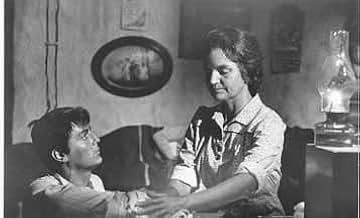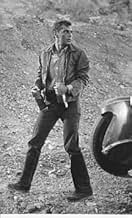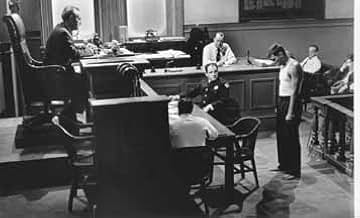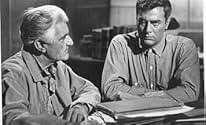NOTE IMDb
7,2/10
1,1 k
MA NOTE
Ajouter une intrigue dans votre langueTony Curtis plays an Indian (Nicknamed "Chief" by other soldiers) who fights in WWII and helps to raise the flag at Iwo Jima.Tony Curtis plays an Indian (Nicknamed "Chief" by other soldiers) who fights in WWII and helps to raise the flag at Iwo Jima.Tony Curtis plays an Indian (Nicknamed "Chief" by other soldiers) who fights in WWII and helps to raise the flag at Iwo Jima.
- Réalisation
- Scénario
- Casting principal
- Récompenses
- 1 nomination au total
Jeffrey Silver
- McGruder
- (as Jeff Silver)
Pete Homer
- Mr. Alvarez
- (as Peter Homer Sr.)
Leon Alton
- Rally Guest
- (non crédité)
Henry Amargo
- Jerry
- (non crédité)
Benjie Bancroft
- Rally Guest
- (non crédité)
Avis à la une
Clint Eastwood in Flags Of Our Fathers has probably given us the definitive version of the story of the flag raising on Mount Suribachi on Iwo Jima. Three of the six were later killed in action before the the flag raising became a Marine Corps symbol. The other three came back to all kinds of publicity because they became media heroes.
Probably you couldn't find three more ordinary guys than Jesse Bradley, Rene Gagnon, and Ira Hayes. The first two lived long lives in respectable obscurity after their 15 minutes of fame finally died down. Ira Hayes was unique in that he both survived and was a minority group member.
When Branch Rickey decided it was time to integrate baseball Jackie Robinson was chosen after a very careful selection process. Ira Hayes was part of a group photograph of a flag raising during a lull in a great battle. Fame chose him and as we see in The Outsider, he wasn't ready to deal with it.
Tony Curtis gives one of his best screen performances as Ira Hayes, the Pima Indian kid who mere chance at being in the photographer's lens when an immortal picture was snapped gave him fame he didn't want to deal with. How could he, really he was probably no better or worse than any of the other men and simply raising a flag during a lull of battle wasn't anything heroic. Hayes was acutely aware of this and felt himself unworthy to be the Jackie Robinson for the Pima Indians.
Such a sad story that Tony Curtis brings to us on the big screen. How would we deal with fame if it was suddenly thrust upon us for no discernible reason? Something Ira Hayes asked until the day he died.
Ira Hayes and Tony Curtis, himself a World War II veteran, wouldn't mind if this review was dedicated to all the men who served in the Marine Corps and fought for that volcanic island in the Pacific called Iwo Jima. Just another hero in the company of thousands of heroes, that's what Ira Hayes would have wanted.
Probably you couldn't find three more ordinary guys than Jesse Bradley, Rene Gagnon, and Ira Hayes. The first two lived long lives in respectable obscurity after their 15 minutes of fame finally died down. Ira Hayes was unique in that he both survived and was a minority group member.
When Branch Rickey decided it was time to integrate baseball Jackie Robinson was chosen after a very careful selection process. Ira Hayes was part of a group photograph of a flag raising during a lull in a great battle. Fame chose him and as we see in The Outsider, he wasn't ready to deal with it.
Tony Curtis gives one of his best screen performances as Ira Hayes, the Pima Indian kid who mere chance at being in the photographer's lens when an immortal picture was snapped gave him fame he didn't want to deal with. How could he, really he was probably no better or worse than any of the other men and simply raising a flag during a lull of battle wasn't anything heroic. Hayes was acutely aware of this and felt himself unworthy to be the Jackie Robinson for the Pima Indians.
Such a sad story that Tony Curtis brings to us on the big screen. How would we deal with fame if it was suddenly thrust upon us for no discernible reason? Something Ira Hayes asked until the day he died.
Ira Hayes and Tony Curtis, himself a World War II veteran, wouldn't mind if this review was dedicated to all the men who served in the Marine Corps and fought for that volcanic island in the Pacific called Iwo Jima. Just another hero in the company of thousands of heroes, that's what Ira Hayes would have wanted.
This film is a somewhat accurate account of Ira Hayes' story, and is well-meaning, but it suffers from the fatal miscasting of Tony Curtis. Curtis certainly tries hard, but the very idea of a Brooklyn-voiced actor with striking good-looks slathered in bronzer playing an ordinary-looking man from Arizona is ludicrous. Granted there weren't any movie star Native-Americans at the time to fill the role, but you never get a sense of an average guy doing his job: Curtis is far too gorgeous (although the make-up people do try to hamper his looks, unfortunately transforming him into something resembling a Romulan from Star Trek.). And yet some would not only ignore this, but also claim this is Curtis' finest performance. Hardly. See 'The Boston Strangler' or 'The Sweet Smell of Success" or 'The Defiant Ones." As for the film, it is relentlessly moody and downbeat, with an equally moody music score. The Iwo Jima material is almost right, but marred by the idea that Hayes would become a mess because of the loss of James Franciscus' character. Not that the fictional character is so bad, but the dull acting of Franciscus makes him impossible to care about. Since the film takes great pains in making this character so important to Hayes, it should be handled by a much more powerful acting presence than a stiff second-rate TV actor. Meanwhile, Hayes' fame rests with his helping put up the famous flag at Iwo Jima and then be put through the war bond drive and publicity grind stateside, yet the two others(Gagnon and Bradley) who were also involved in both flag raising and publicity war bond tour are barely in this film. 'Flags of Our Fathers' takes full advantage of this character interaction, but this film ignores it almost completely (granted it could have been due to rights issues from Gagnon and Bradley).
But it IS a story that was important to tell and worth watching, regardless. Sadly it was not a success back in 1961 and remains obscure to this day. Possibly 'Flags of Our Fathers' will give it new life.
But it IS a story that was important to tell and worth watching, regardless. Sadly it was not a success back in 1961 and remains obscure to this day. Possibly 'Flags of Our Fathers' will give it new life.
This is the sad and touching story of Ira Hayes, with a fine acting job by Tony Curtis. Do not expect action scenes with battles and heroics. There is only a brief section that takes place on Iwo Jima;the rest is drama. Some may argue about this or that point of historical accuracy-- with good reason probably--but when all that is done, we're left with just a good drama about a young man who could not cope with the bizarre role of 'national hero' that fate forced upon him. The story is about how events outside his control affected his relationships with friends, family, his community, comrades and his country. We wish life could have turned out better for such a decent man.
Tony Curtis portrays Ira Hamilton Hayes, the Pima Indian Marine caught in the photograph by Joe Rosenthal, as well as he subsequent struggle with Post-Traumatic Stress Disorder.
Curtis gives a simple, telling performance as the made miserable by his acclamation as a hero, after he buddy James Franciscus was killed in battle. His death is whitewashed a bit, but it's a telling portrait of a man wrecked by the realities of war.
Nowadays we are supposed to express our disdain at the casting of a New York Jew as a Southwestern Indian. Without a box-office draw like Curtis in the role, it's unlikely the movie would have ever been made.
Curtis gives a simple, telling performance as the made miserable by his acclamation as a hero, after he buddy James Franciscus was killed in battle. His death is whitewashed a bit, but it's a telling portrait of a man wrecked by the realities of war.
Nowadays we are supposed to express our disdain at the casting of a New York Jew as a Southwestern Indian. Without a box-office draw like Curtis in the role, it's unlikely the movie would have ever been made.
The movie itself stands on it's own merits and might be applauded for the telling of this powerful true story, but when other film makers like John Ford had used REAL Native Americans in movies, this was yet another slap in the face to Native Americans .
The movie itself also tended to use Hayes' personal weakness for alcohol to reinforce the belief that ALL Native Americans were prone to alcoholism.
While it is widespread on some reservations...it is because they were forced to live in that environment for decades where they have little do and must fall back on "the public dole"...and suffer the worst economic structure in the U. S.
This movie is long over-due for a re-telling...and the skills of Mr Curtis has nothing to do with my review.
The movie itself also tended to use Hayes' personal weakness for alcohol to reinforce the belief that ALL Native Americans were prone to alcoholism.
While it is widespread on some reservations...it is because they were forced to live in that environment for decades where they have little do and must fall back on "the public dole"...and suffer the worst economic structure in the U. S.
This movie is long over-due for a re-telling...and the skills of Mr Curtis has nothing to do with my review.
Le saviez-vous
- AnecdotesIn June 2016, the Marine Corps determined that Pharmacists Mate John Bradley was not actually among the six flag raisers in the famous photograph.
- GaffesIra Hayes was awarded the Parachutist Badge upon his completion of jump school, which he attended after his boot camp training. Later he earned the Presidential Unit Citation for his combat actions in the Pacific. Yet neither of these awards appear on his uniform after he returns to the United States for the war bond tour. (However, his uniform does correctly include ribbons for the American Campaign Medal and the Asiatic-Pacific Campaign Medal.)
- Citations
James Sorenson: [to Hayes kiddingly] If you're about to kiss me, banjo butt, I can tell you you're the wrong type.
- ConnexionsReferenced in Chappaqua (1966)
Meilleurs choix
Connectez-vous pour évaluer et suivre la liste de favoris afin de recevoir des recommandations personnalisées
- How long is The Outsider?Alimenté par Alexa
Détails
- Durée1 heure 48 minutes
- Couleur
- Rapport de forme
- 1.85 : 1
Contribuer à cette page
Suggérer une modification ou ajouter du contenu manquant

Lacune principale
By what name was Le héros d'Iwo-Jima (1961) officially released in India in English?
Répondre































